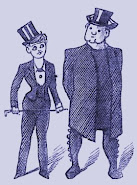Precious Jules
(Jules Feiffer)
These memoirs will sometimes coincide with other remembrances, so
I was reminded that the day I write this, January 26, is the birthday of Jules
Feiffer. He was born in 1929. It has been one of the honors of my life to know
Jules, to call him a friend, to have worked with him.
Knowing Jules is a cheap way of feeling like a whole room-full of
people are friends. It saves time. Having conducted many interviews and written
biographies, one day I realized that precious few cartoonists have had feet –
or hands – in virtually every category of cartoon art. Walt Kelly is one –
strips, comic books, animation, political cartoons, columns, music, illustration,
advertising. Al Capp came close to that “full house.”
Jules Feiffer has had many careers – succeeding, and successful,
activity in even more realms besides cartoons: comic books (The Spirit),
strips (his mononymous Feiffer), books (many collections, and original
titles like Passionella and Other Stories), children’s books (including A Barrel of Laughs, A Vale of Tears), animation (script for Munro, 1961 Oscar),graphic
novels (Kill My Mother and others), illustration (The Phantom
Tollbooth), musicals (The Man In the Ceiling), plays (Little
Murders), screenplays (Carnal Knowledge and Popeye), novels
(such as Harry, The Rat with Women), histories (The Great Comic-Book
Heroes), and autobiography (Backing Into Forward). Jules has
collected so many awards and honors that he had to move from Manhattan to
Shelter Island, just to make room.
These activities, titles,
and credits are tips of many icebergs; and everyone knows his name and his
works. The wispy lines and casual compositions, even to the invariable absence
of panel borders in the strips. But his works, especially lately and especially
his favored dancing figures, betray a killer grasp of anatomy. (I was also
grateful to compile a preliminary list of his ouevre, because I seldom
get the chance to employ “mononymous,” much less “oeuvre.”)
When I was a kid, the only reason I bought The Village Voice was to read Feiffer; just as the original reason I bought The Realist was Jean Shepherd. So when I became Comics Editor of Publishers Newspaper Syndicate (previously Hall Syndicate and Field Enterprises and Publishers-Hall; and eventually News America Syndicate and North America Syndicate…) Jules Feiffer was in my stable.
Only technically. Like
Herblock and a few others, Feiffer was a cartoonist who was distributed by us,
but “edited” separately or by others. Milton Caniff’s Steve Canyon carried
our copyright, but contrary-wise, was edited and distributed by King Features.
So I never had to edit Feiffer’s work – how could anyone, except maybe spelling
errors? – but I sure enjoyed the advance peeks. Since many strips were topical,
he worked on a tight deadline, two at a time.
As I did with most of the
cartoonists while I was at Publisher’s, I established contact and visited them
in their lairs. Jules lived in Manhattan, upper West Side, and in my first
visit, a look at his walls, where so many other things could and did hang, I
discovered that he liked vintage comic strips. I was able sell him some
treasures from my collection, and others I found.
 |
| [b] A drawing of the Honorable Richard Nixon around the time of the president’s resignation. Feiffer published two books off Nixon’s corruption and scandals. |
Not a surprise to anyone
who appreciates his output, but Jules is a polymath, interested in almost
everything, and the point, modestly but earnestly, of wanting to know
everything about everything.
We had other meetings
including at meetings of the American Association of Editorial Cartoonists, but
the fondest memory is one I have told here in a remembrance of Tony Auth. When
I lived outside Philadelphia, Tony called one day and said that Jules was
coming to town – actually Cheltenham, the next town to my Abington – to speak
at the high school in a special evening program. Cheltenham is a special
enclave, its high school lobby’s wall festooned with pictures of notable grads
including unlikelies like Benjamin Netanyahu. But that night Jules Feiffer
would grace the stage.
Tony, Pulitzer Prize
winner of the Inquirer, was asked by Jules to be his shepherd and guide
that day; and Tony in turn asked if they might visit my house, maybe to look at
parts of my collection.
[c] Feiffer, June 15, 1967
Well, that turned into a full and fun afternoon – and early dinner prepped by
my wife Nancy – digging through piles of originals, stacks of old newspaper
comics; runs of political-cartoon magazines like Puck, Judge,
Life, and The Masses; and many more of the rare old European
magazines of graphic commentary and social protest. Jules loved the classic
cartoons.
I loved it more when that
evening, in the school auditorium, despite his slide show, he made repeated
references to things in “Rick’s collection,” with probably two people out of
600 knew who the hell Rick was (and they were Tony Auth and a friend from
France who staying with us).
Jules is still going
strong at 90, the last I checked writing, drawing, and teaching. A great life,
and life for us to behold, for a kid from the Bronx who started in the
business(es) by offering to work for free with Will Eisner. That’s the spirit!
– that’s how much he loved drawing cartoons. After success with Eisner, he
first approached the Voice with the same offer – that’s how much he
loved drawing cartoons.
25
















Bravo!!!
ReplyDelete